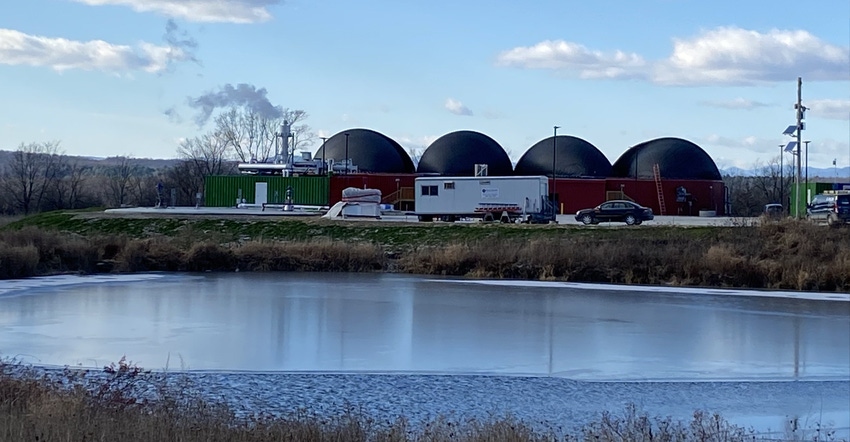AstraZeneca Invests in RNG to Decarbonize Pharmaceutical Manufacturing
Pharma giant AstraZeneca, with a presence in over 160 countries, has an expansive environmental footprint, consuming massive volumes of power for essential operations and relying on a vast supply chain with its own utilization-associated emissions.

Pharma giant AstraZeneca, with a presence in over 160 countries, has an expansive environmental footprint, consuming massive volumes of power for essential operations and relying on a vast supply chain with its own utilization-associated emissions.
Burning natural gas for heat and power generates 96% percent of the global corporation’s carbon footprint. Its manufacturing facilities, some sprawling 400,000 to 800,000 square feet, require continuous humidity and temperature controls. Recirculated air is prohibited in certain areas, demanding more energy. And mass-producing medicines necessitates usage of mega volumes of purified water.
But the emissions resulting from these processes will soon plunge. AstraZeneca has entered a 15-year agreement with Vanguard Renewables to purchase renewable natural gas (RNG) sourced from cow manure and food scraps that will be processed through anaerobic digestion at dairy farms. By 2026, the collaboration will provide up to 650,000 million British thermal units (MMBtu), or 190,500 megawatt hours (MWh) per year, of RNG to AstraZeneca’s U.S. manufacturing plants and labs. That’s equal to the energy needed to heat just over 17,800 homes for a year.
“By sourcing energy from RNG produced through anaerobic digestion, AstraZeneca gets clean methane for electricity, and no carbon is added to the atmosphere. Farmers benefit from associated byproducts – fertilizer [low-carbon digestate] and cow bedding [from the separated solids],” says Andrew Wirths, senior vice president Supply Americas, AstraZeneca.
Switching to “clean heat” at its U.S. manufacturing sites alone will eliminate nearly 50,000 tons a year of Scope 1 greenhouse gas emissions. Using manure rather than leaving it in fields, and food scraps that would otherwise be destined for landfill could potentially drive down emissions by about 100,000 more tons.
A corporate goal to hit net zero by 2026 spurred plenty of thought around what kind of decarbonization project made most sense, and timing was a big factor. Finding a partner that could act nimbly and aggressively would be key.
RNG, just introduced at the first site, the Newark, Delaware campus, became the go-to strategy, ranking over electrification. Transitioning to electric would require deep investments in new, massive boilers and years to expand the grid to support the energy load—if and where sufficient grid access were possible.
“With RNG we can use our existing infrastructure. It does not interfere with our operations. There are no extra capital expenses. And we get speed by working with Vanguard to bring established farms online rather than work with a utility,” Wirths says.
Vanguard Chief Strategy Officer John Hanselman calls the partnership a game changer in the voluntary offtaker market. It’s the largest open market RNG deal to date, he says.
He sees the agreement with AstraZeneca as the tipping point.
“It sends a message to all companies that have made sustainability commitments that there is an alternative to fossil natural gas, and a path to help them reach their net-zero targets.”
For now, most of the offtakers are energy companies looking to decarbonize their footprint or to offer their customers a means to decarbonize.
“What’s different about this relationship is it allows us to sell directly to users and allows them to follow the molecule from the digester to their manufacturing facility so they can accurately account for their emissions reduction, based on their industry and the reporting standards that apply to them,” Hanselman says.
AstraZeneca has a $1 billion sustainability initiative, Ambition Zero Carbon, focused on maximizing energy efficiency, shifting to renewables, and investing in nature-based removals—projects that extract carbon from ecosystems, enabling companies to compensate for their residual emissions.
Globally the company is reaching for a 98% reduction in Scope 1 and 2 emissions by 2026 from a 2015 baseline. Looking beyond its own operations, the goal is to halve the entire value chain’s carbon footprint by 2030 and to achieve a 90% reduction by 2045 from a 2019 baseline.
The most immediate milestone—the end of 2025 – is not far away. AstraZeneca is banking on the partnership with Vanguard to provide the push to help get there.
Meanwhile, more businesses are eying RNG as they get serious about environmental, social, and governance (ESG) goals, which broaches the question: how fast can this biogas-based commodity be generated at scale?
The consulting firms that track the supply and demand of RNG are predicting a gas shortage for the coming decade, Hanselman says. Bracing to keep up and help facilitate circularity, Vanguard has signed supply options with 100 farms.
“Not all of them will come to fruition for one reason or another, but we are prepared for the expansion and to provide the highest quality product at a competitive price,” he says.
It will also take massive food waste tonnage to make the co-digestion model work. That means teaming up with food waste generators to tap into the tonnages of methane they crank out.
“There is opportunity for them to create a truly circular energy story. The interest is there and coming from every type of manufacturing you can think of, including companies that everyone has heard of,” Hanselman says, though he can name none for now.
For a major drug-manufacturer like AstraZeneca, operations are dynamic, and the future is unpredictable. The 15-year contract was drawn with these considerations in mind. Written into the deal are a guaranteed fixed price, the option to extend the contract, and to step up the supply if and as needed.
“We are confident we have the flexibility to bring the pipeline through, and to make sure we are doing it in a sustainable way,” Wirths says.
About the Author(s)
You May Also Like




